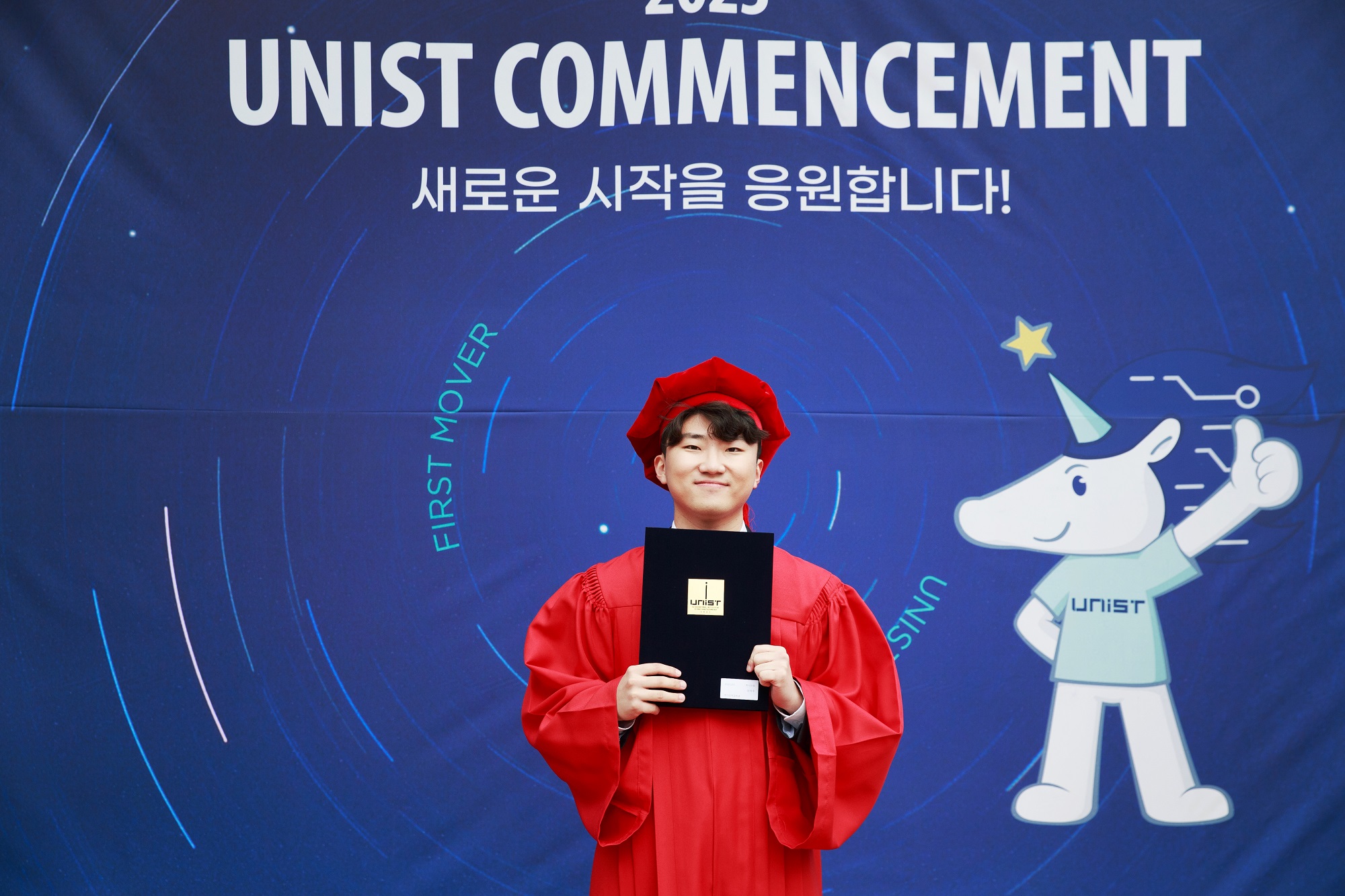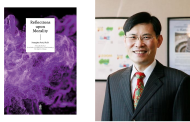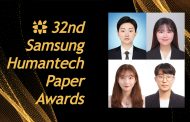The 2023 UNIST Commencement Ceremony was held successfully at the Gymnasium of UNIST on February 16, 2023.
Seokju Lee, a recent graduate from the Department of Electrical Engineering at UNIST, delivered a speech as the representative of the Class of 2023. It is noteworthy that he has been completed all the graduation requirements in six semesters, and thus has been bestowed with the Minister of Science and ICT Award. He also has the history of participating in the B.T.S (Brain to Society) program, which UNIST places special emphasis on.
“I have been running toward my dream of becoming a robot engineer for 18 years since I was 5 years old, and UNIST was a choice for me without regret in that path,” noted Seokju Lee. “I hope that UNIST is a point of increase state, not a local minimum point on the life graph for all of the graduates.”

Seokju Lee, a recent graduate from the Department of Electrical Engineering at UNIST, is standing in front of the photo wall at the 2023 Commencement Ceremony.
[Q&A with Seokju Lee, 2023 Graduate from UNIST]
Q. Please introduce yourself briefly?
I have recently earned a Bachelor’s degree from the Department of Electrical Engineering. I have completed all the graduation requirements in six semesters, and thus graduated early. Upon graduation, I plan to attend graduate school and conduct more in-depth research.
Q. What made you study electrical and electronic engineering?
I have dreamed of becoming a robot engineer since I was five years old, and for this reason, I thought about choosing a major between mechanical engineering and electrical and electronic engineering at the end of my first year. I think I chose the Department of Electrical and Electronic Engineering because I was a little more interested in the software aspect of the robot.
Q. How do you feel about receiving the Minister of Science and ICT award and delivering a graduation speech at the same time?
At first, I thought there were much better graduates than me, so I didn’t even expect to win the award, but I was so surprised and happy to hear that I won the Minister of Science and ICT award. On top of that, I was asked if I could make an additional speech for the graduates, so I was worried that I could stand in this position first. However, I was glad to prepare a representative speech because I thought the information I was saying might be helpful to someone.
Q. You have also participated in the “B.T.S Program” at UNIST. How did it help you both academically and personally?
By taking part in the program, I have learned to persevere and adopt a growth mindset, which ultimately empowered me to achieve my goals. I have also conducted a study on the “Development of Autonomous Driving Platform for Non-Face-to-Face Delivery Services.” In addition, the research was conducted under the theme of “Development of an autonomous driving platform for non-face-to-face delivery service.” Through the purpose of solving practical problems, I have learned to pay more attention to various fields, such as SLAM research and mobile app development.
Q. What is your next career step?
First of all, after graduation, I want to study overseas research patterns and improve my research skills by completing my graduate program. Since then, I want to return to Korea and become a researcher who strives to develop robot research so that the concept of robots can be easily accessed in everyday life.
Q. What are you hoping to research in graduate school?
I am planning to study a four-legged walking robot. In particular, I would like to conduct a study that applies learning-based design and control for quadruped walking robots, such as MIT’s Robotic Cheetah and the ANYmal robot at ETH Zurich, and further applying deep reinforcement learning (DRL). Since research in various fields, such as autonomous vehicles and walking robots can be conducted in the same laboratory, I would further like to study autonomous driving, while studying walking robots.
Q. Any last word?
I am so grateful to have Professor Jeong Hwan Jeon as my mentor, as he has been extremely supportive and given me great guidance throughout my academic years at UNIST. I would like to thank the seniors at the Robotics and Mobility Lab who have helped and supported me when I had difficulties during research. I would also like to thank the people who helped me through this journey, like my beloved parents, family, friends, and colleagues. Without all of your help, this would not have been possible.


![[2023 Commencement] Speech by Graduate Representative](https://news.unist.ac.kr/wp-content/uploads/2023/02/KakaoTalk_20230220_101817587_01-800x428-800x428.jpg)



![[2026 UNIST Commencement] “Become Way Makers Who Open Paths Where None Are Drawn!”](https://news.unist.ac.kr/wp-content/uploads/2026/02/사진-박종래-총장이-UNIST-학위수여식사를-전하고-있다-3-1-190x122.jpg)
![[2026 UNIST Commencement] Voices of Class of 2026](https://news.unist.ac.kr/wp-content/uploads/2026/02/Untitled1-190x122.jpg)




